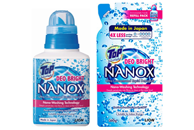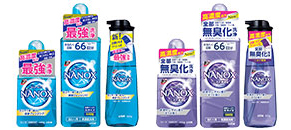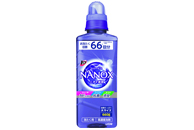The Lion Group aims to reduce water use to help realize a resource-circulating society. In 2019, Lion began calculating water use throughout the supply chain in order to understand water use throughout product life cycles—from raw material procurement to production, transport, use and disposal. Total water use throughout the life cycles of Lion’s products in 2020 was approximately 2.3 billion m3.
Breakdown of Water Use over the Life Cycles of Lion Products

Scope: Lion and domestic and overseas consolidated subsidiaries, January–December 2020.
At 76.2%, the product life cycle stage that accounted for the largest portion of total water use in 2020 was use by consumers. This is because many Lion products, such as laundry detergents, are used with water for washing. The second highest level of water usage was at the raw material procurement stage, reflecting the use of water in cultivating plants used as raw materials and for cleaning in material manufacturing processes. The Lion Group will continue to work to provide products that help save water and to coordinate with suppliers to reduce water use.
The Lion Group continuously monitors water usage (water withdrawal) and wastewater discharge in its business activities as it strives to alleviate environmental impact and reduce water usage through recycling. We have been implementing ongoing measures to reduce water used in cleaning processes. As part of these efforts, in 2016, we began operating industrial wastewater recycling facilities at the Chiba Plant. In addition, we use limited quantities of rainwater collected from the plant roof for cooling and for watering flowerbeds.
Lion established the Eco Vision 2020 environmental targets in 2013. In 2020, the final year of Phase
3 (2018–2020) of Eco Vision 2020, our employees worked as one to achieve the Lion Group’s
environmental targets.
Compared with 2000 levels, both water usage per unit of net sales and water use in absolute terms
were reduced in 2020. Water usage per unit of net sales was down 58% and significantly surpassed the
2020 target of 35% reduction. Water use in absolute terms was also down 55%, greatly exceeding its
23% reduction target. We will continue striving to reduce water consumption even further.
Water Use in Business Activities (Domestic)
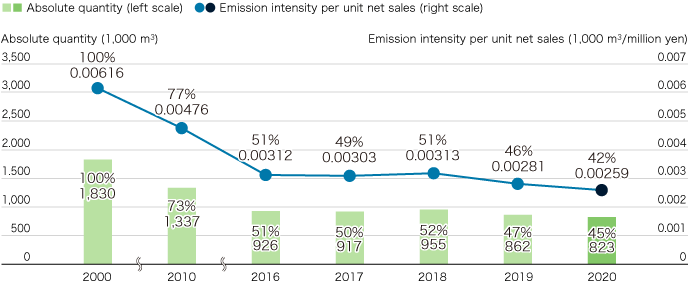
Scope: Lion and all domestic consolidated subsidiaries, January-December 2020
Wastewater Discharge in Business Activities
The Lion Group manufactures and sells products that are closely tied to water usage. Moreover,
Lion’s plants use a great deal of water in manufacturing processes to clean facilities and in
heating and cooling equipment. Recycling wastewater after use can thus produce a significant
water-saving effect. To this end, Lion introduced a wastewater recycling system at the Chiba
Plant—which uses the most water among Lion’s plants—in 2016 that has been in continuous use since
installation. The greatest feature of this system was the adoption of new wastewater recycling
facilities (①). Thanks to these facilities, we are now able to recycle wastewater from production
processes that was previously discharged into the environment. Furthermore, we installed new
wastewater treatment facilities (②) that enable greater purification of water from employee sanitary
facilities and cleaning facilities than was previously possible, better removing nitrogen, which is
a source of marine eutrophication.
In 2020, we conserved about 160,000 tons of water annually compared to 2010. That amount is
equivalent to about 20% of the total water usage of all domestic operating sites in 2020.
The Chiba Plant’s Wastewater Recycling System
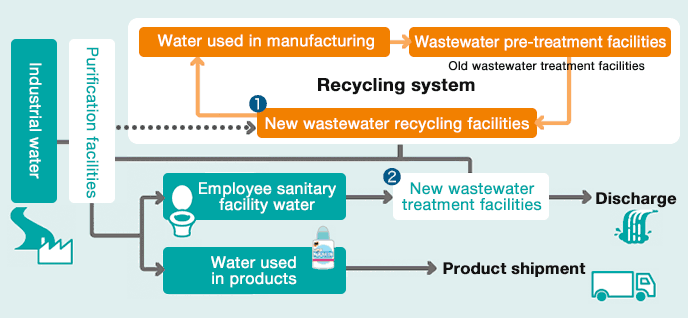
The Chiba Plant was the first household product factory in Japan to recycle wastewater. In 2017, the plant received the New Technology Encouragement Award*1 from the Japan Society on Water Environment and the Responsible Care Award*2 from the Japan Chemical Industry Association.
*1 In June 2017, the development of the Chiba Plant’s wastewater recycling system was recognized with the New Technology Encouragement Award from the Japan Society on Water Environment, Japan’s largest academic society related to protecting the aquatic environment. This award is given for research related to aquatic environments or to individuals or organizations that have devised innovative, promising aquatic environment technologies from the perspective of social contribution.
The Japan Society on Water Environment New Technology Encouragement Award [Japanese]*2 In May 2017, the Chiba Plant received the 11th Responsible Care Award from the Japan Chemical Industry Association for its initiatives to protect the aquatic environment and contribute to the local community. Since the start of its operations, the Chiba Plant has continuously implemented activities to protect the aquatic environment.
Lion’s Responsible Care Activities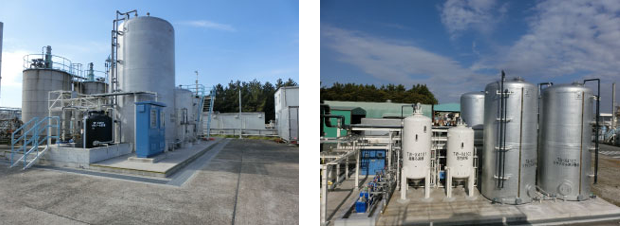
The Lion Group is also working to reduce water usage during product use by customers. For example,
while conventional laundry detergents are designed for use with two rinses, we are now expanding our
lineup of one-rinse laundry detergents.
The Lion Group established the Eco Vision 2020 environmental targets in 2013. In 2020, the final
year of Eco Vision 2020, household water usage during product use per unit of total revenue was
reduced by 55% compared to 2000 levels, exceeding the 2020 target of 45% reduction, and water use in
terms of absolute quantity was down 51%, also exceeding its target of 33% reduction. Going forward,
we will continue to promote and develop products that help reduce water usage during product use—the
product life cycle stage that accounts for the greatest portion of said use—and thus reduce overall
water usage.
TOP SUPER NANOX
TOP SUPER NANOX For Odors
These laundry detergents rinse away easily, enabling one-rinse washing.
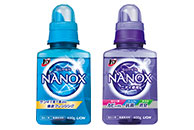
CHARMY Crysta Gel
These dishwasher detergents demonstrate high detergency even when used in quick wash cycles, effectively removing grime from dishes and dishwasher interiors.
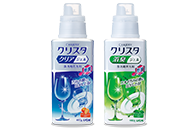
CHARMY Magica Enzyme + (“Plus”)
CHARMY Magica Quick Dry + (“Plus”) Antibacterial
CHARMY Magica Antibacterial + (“Plus”)
These nano-cleansing dishwashing detergents make stubborn grease slide off dishes like water, helping save time and water when washing up.
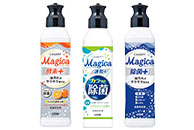
Lion sells TOP SUPER NANOX through Lion Corporation (Singapore) Pte Ltd, Lion Home Products (Taiwan) Co., Ltd. and Lion Daily Necessities Chemicals (Qingdao) Co., Ltd., helping to save water.
